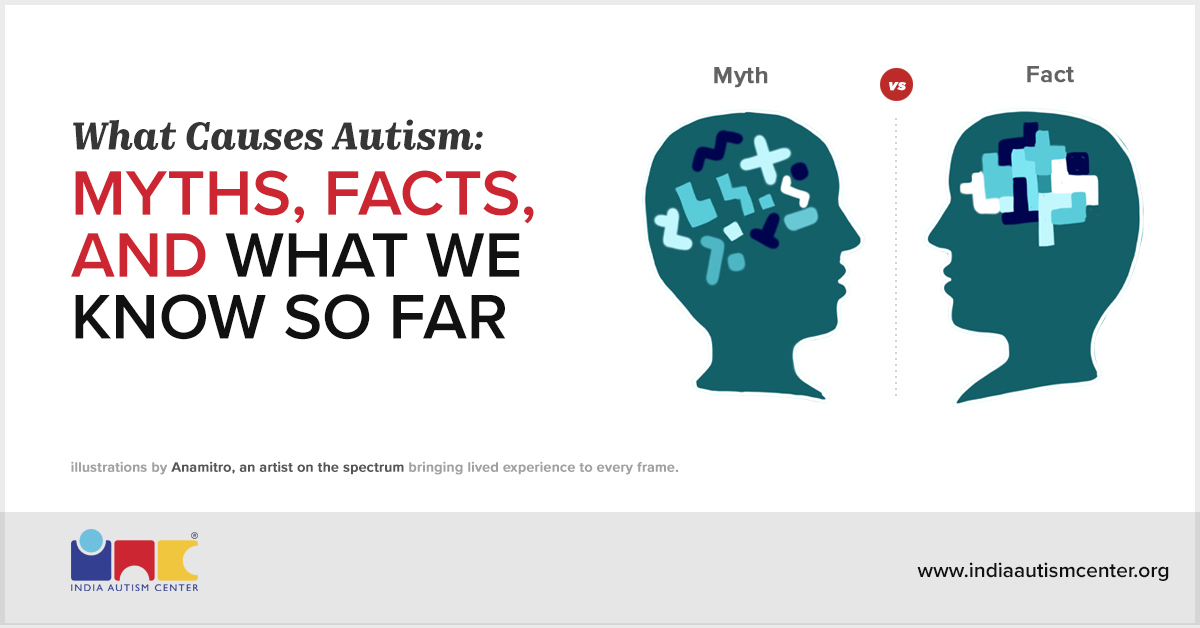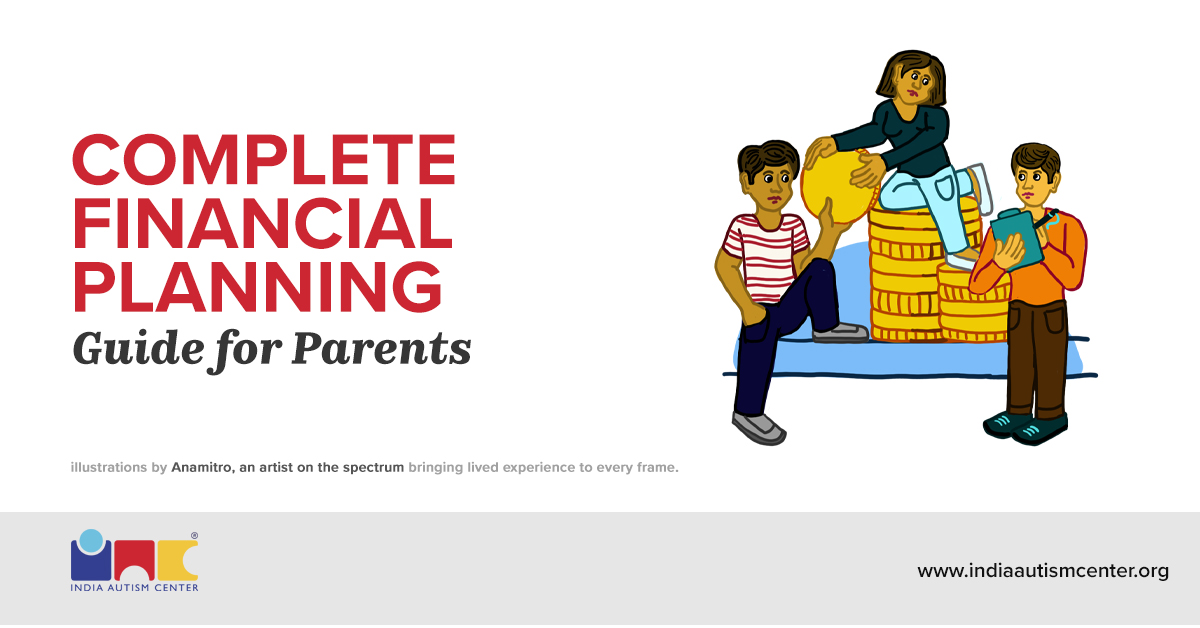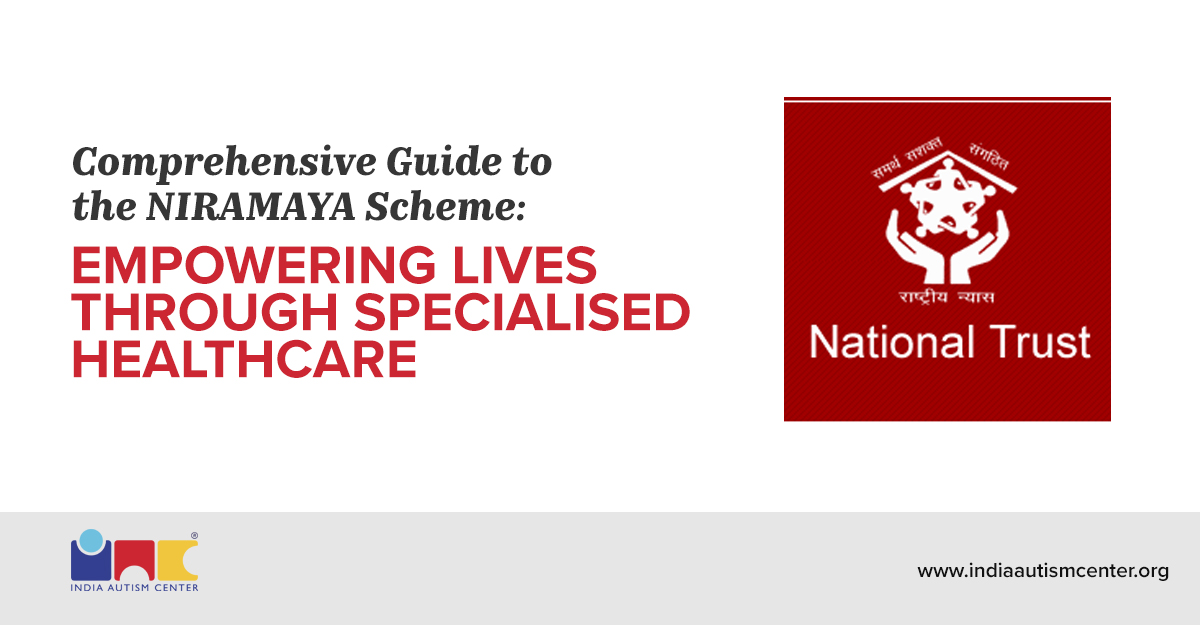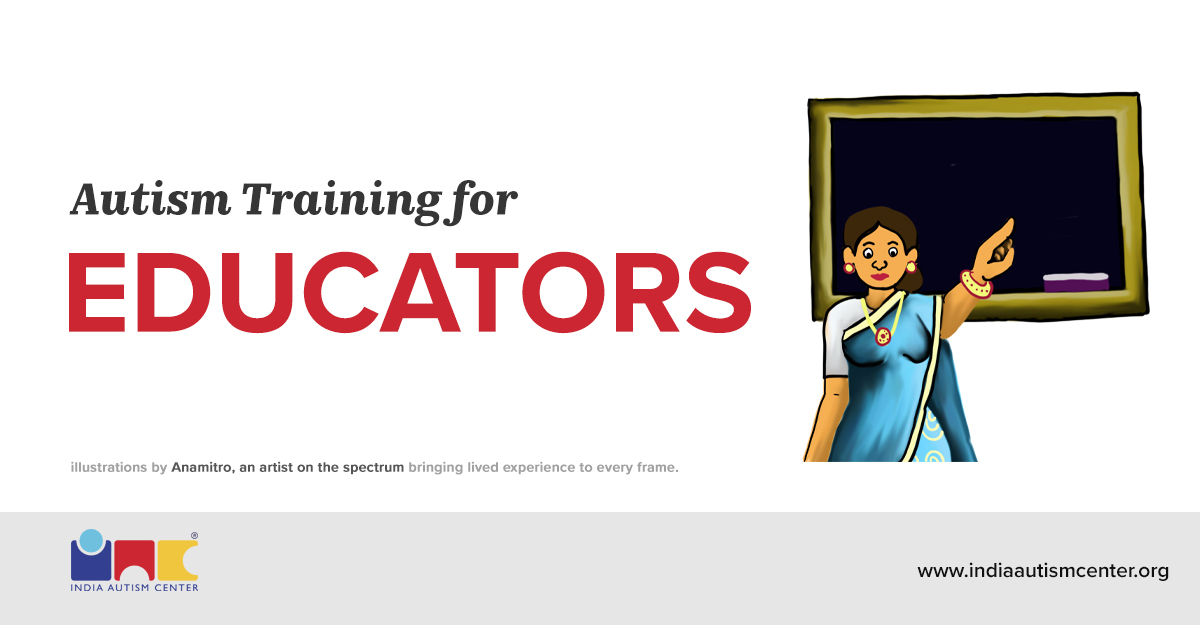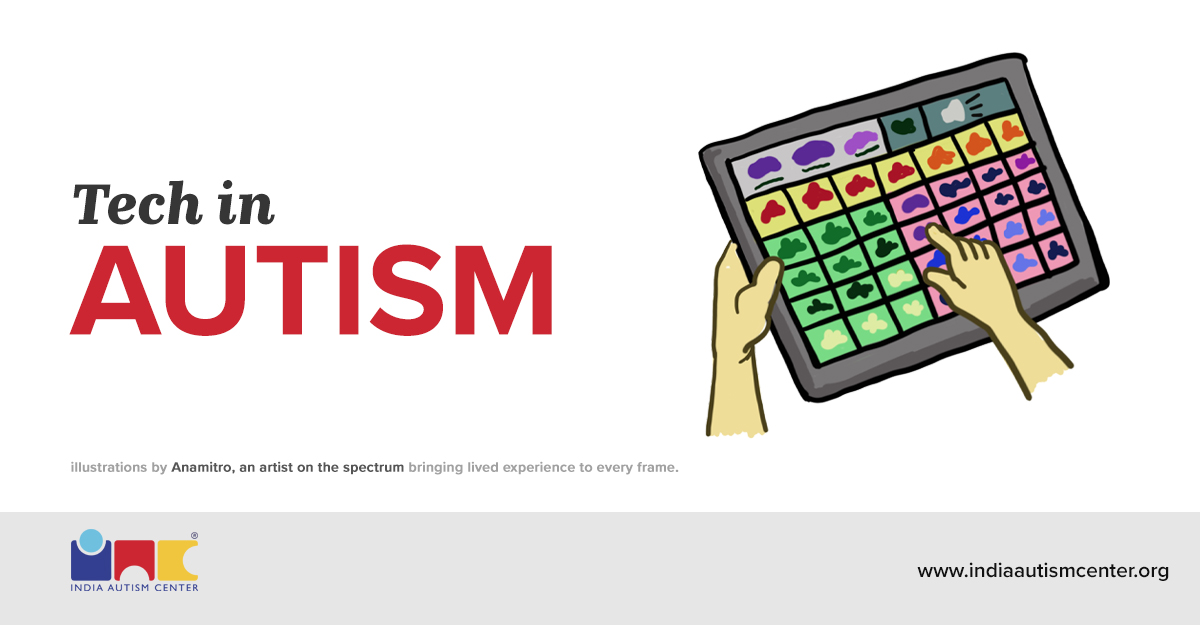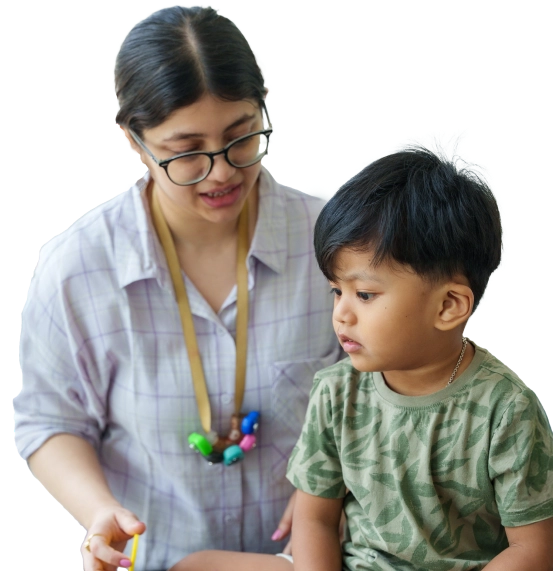One of the most searched, and often quietly asked, questions is: ‘What causes autism?’.
The short answer? The causes of autism spectrum disorder (ASD) are multifactorial.
Autism arises from a complex interplay of genetic, neurological, and environmental factors. And despite persistent misinformation, vaccines do not cause autism.
In this article, we’ll break down these factors behind autism causes and also explain why it’s time to leave certain outdated beliefs in the past.
So, let’s take a closer, evidence-based look at the causes of autism.
What Causes Autism Spectrum Disorder?
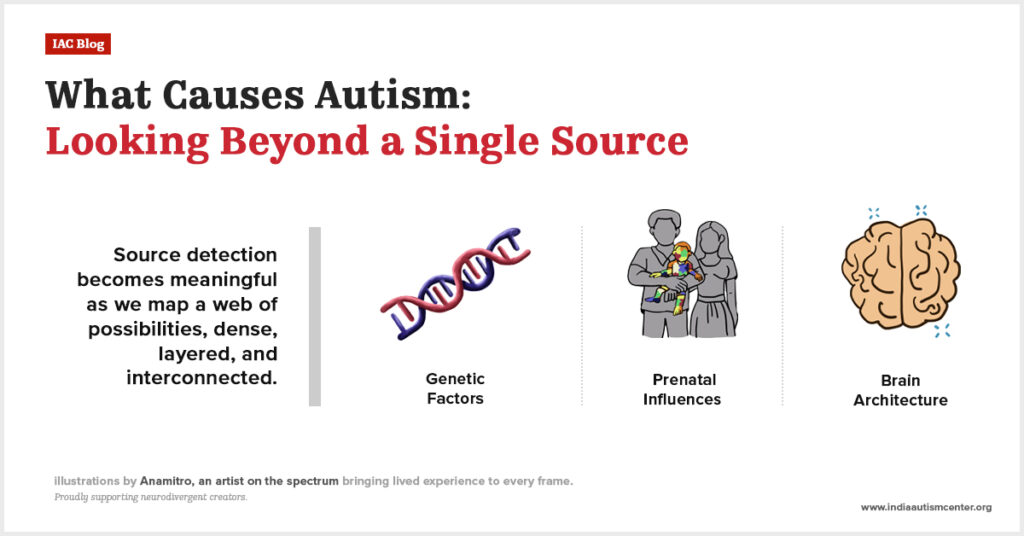
If you’re a parent, a professional, or simply someone seeking a deeper understanding of autism, this is where the lens shifts.
From ‘What is autism caused by?’ to ‘What is the combination of factors that may have led to this condition?’.
Some of these factors could be inherited. Others may come from the environment around a developing fetus. And some could emerge through neural connectivity in early life.
Now comes the question is autism gentic?
Among all the possibilities of how autism is caused, genetics remains the most well-established.
So, let’s start there.
Role of Genetics In Causing Autism
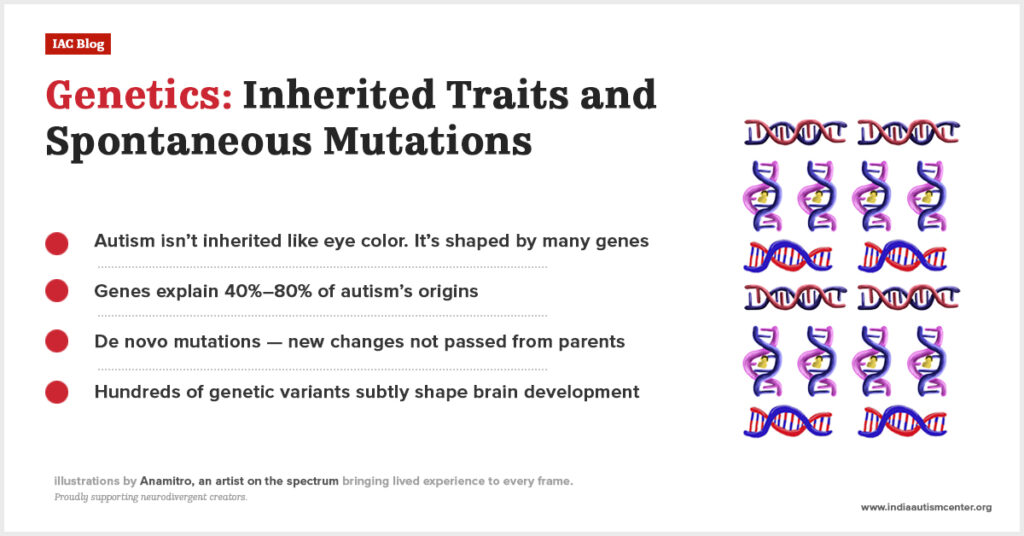
Is autism genetic? Well, it plays a foundational role in the causes of ASD. Estimates suggest that the heritability of autism ranges between 40% and 80%.
This indicates that autism often runs in families. But not in the simple, Mendelian way we learned in school.
Unlike eye color or blood type, autism isn’t caused by a single gene. Thanks to tools like Genome-Wide Association Studies (GWAS), researchers have now identified hundreds of genetic variants linked to autism.
This makes autism a polygenic condition, meaning it’s shaped by many genes working together, each contributing a small effect.
Most of these genes don’t directly cause autism. Instead, they affect brain wiring, especially in areas tied to:
- Sensory processing
- Language acquisition
- Motor coordination
- Emotional regulation
- Social cognition
Some of these gene variations are inherited from parents. Others are what scientists call de novo mutations, meaning they occur for the first time in the egg or sperm, not passed down from either parent.
Rare genetic syndromes like Fragile X syndrome or Rett syndrome may also share overlapping traits with autism, though they account for only a small fraction of overall autism cases.
In short, if you’re wondering, ‘What gene causes autism?’, the reality is far more complex. It’s not about one gene. But rather, a combination of inherited and spontaneous mutations that shape how the brain is wired.
Want to know more? Get in touch with us.
Now, let’s move on to brain development, where the genetic factors of autism begin to take shape.
Role of Brain Development In Autism
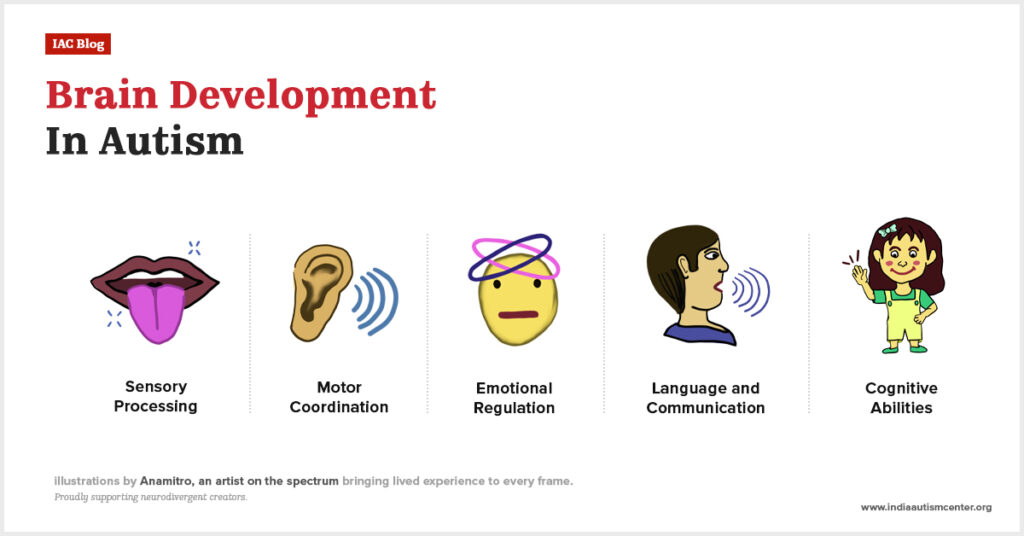
Neuroimaging research shows that autistic brains follow distinct developmental trajectories. Some brain regions may show increased connectivity, while others demonstrate delayed or accelerated growth.
These patterns aren’t random. They reflect alternative ways the brain organizes, adapts, and interacts with the world.
Here’s how these differences play out:
- Sensory Processing: Some autistic individuals may be hypersensitive to light, sound, or texture. Others may seek more sensory input. These sensory differences stem from how specific neural circuits develop.
- Motor Coordination: Delays in crawling, walking, or fine motor skills are often linked to neurological differences in movement planning and control.
- Cognitive Functioning: Challenges with attention shifts, task switching, or transitions can arise from altered synchronization between neural networks.
- Emotional Regulation: Many autistic individuals experience difficulty recognizing, processing, or managing emotions.
- Language and Communication: Some autistic children may display early nonverbal communication but delayed speech, while others might develop verbal skills yet struggle with social language. These variations depend on how the autistic brain maps speech and social understanding.
As neuroscientist Dr. Sumantra Chattarji noted on the India Autism Center podcast,
![]()
The fact that [the brain is] not a static entity. It can adapt fully with experience and change… that’s plasticity. So there can be good plasticity… the brain grows, it forms the right connections, it has all this potential. And the job for us is to use what we know about good plasticity to counter the ill effects of the bad plasticity.
In other words, autistic brain development is a dynamic process shaped by early experiences, genetics, and environment. And like any brain, it’s capable of growth, adaptation, and learning.
Now, genetic predispositions and brain architecture don’t tell the whole story. The surrounding environment, particularly during pregnancy and infancy, also shapes outcomes.
What Environmental Factors Cause Autism?
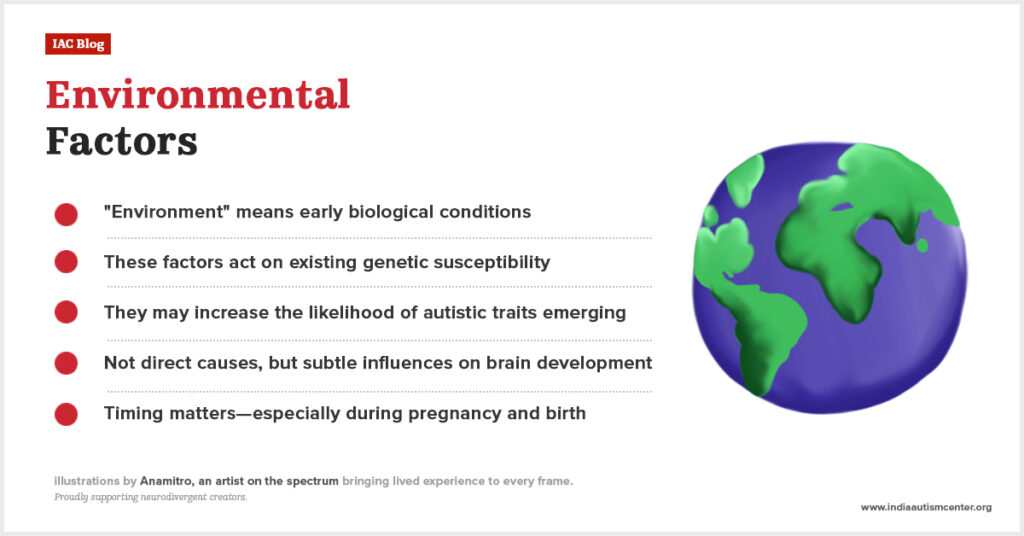
To understand the environmental causes of autism, it’s essential to zoom out.
Here, ‘environment’ refers not just to pollution or toxins, but to the entire biological backdrop that shapes early brain development: before birth, during delivery, and after.
The Prenatal Stage: Influences Before Birth
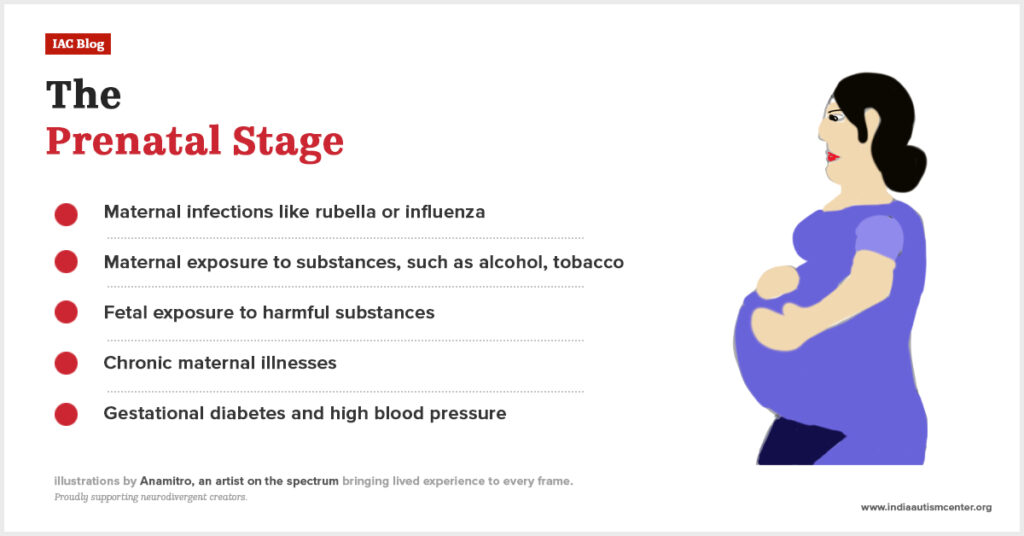
Autism often begins before birth, long before any visible signs appear.
When exploring what causes autism during pregnancy, researchers point to a combination of key prenatal risk factors, including:
- Maternal Infections: A 2019 study linked maternal immune activation (MIA) to later neurodevelopmental differences, including autism.
- Exposure to Substances: Alcohol, tobacco, or recreational drugs during pregnancy can disrupt neural development.
- Toxic Exposures: Lead, mercury, and other environmental toxins may interfere with how the fetal brain forms and connects.
- Chronic Maternal Conditions: Autoimmune or thyroid disorders may alter hormonal regulation and affect fetal brain growth.
- Metabolic Conditions: A 2012 study found that maternal metabolic conditions, such as diabetes, hypertension, and obesity, are broadly linked to neurodevelopmental conditions like autism.
- Certain Medications: Drugs like valproic acid during pregnancy have been associated with higher autism risk.
- Nutritional Deficiencies: Particularly low folic acid levels during early pregnancy have been linked to increased neurodevelopmental risk.
- Parental Age: Advanced maternal or paternal age is associated with a slight rise in de novo genetic mutations, which may influence autism development.
The Natal Stage: Risk Factors Around Birth
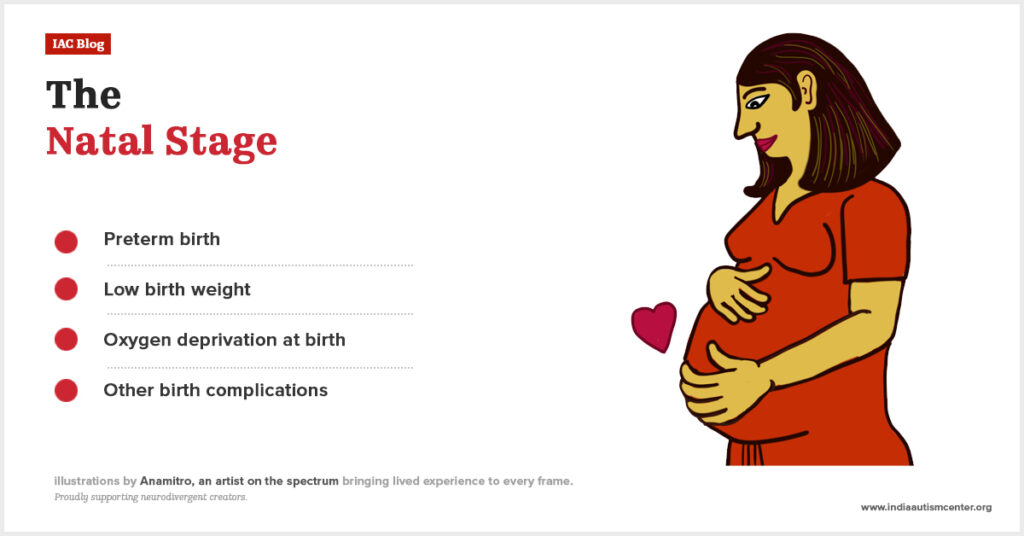
What happens during or immediately after birth may also influence how autism traits unfold.
- Preterm Birth: Babies born before 37 weeks are at a critical stage of brain development. The third trimester, in particular, is key for building sensory and regulatory pathways.
- Low Birth Weight: Weighing under 2.5 kg (5.5 lbs) has been modestly linked to a higher likelihood of autism, possibly due to brain immaturity at birth.
- Oxygen Deprivation at Birth (Perinatal Hypoxia): Difficult labor or brief interruptions in oxygen supply can influence nervous system development.
- Birth Complications: Conditions such as neonatal jaundice or early infections can add stress to a developing brain, especially when compounded by prenatal or genetic vulnerabilities.
While these complications are rare, they offer insights into how biological stressors at birth may act as a contributing factor.
The Postnatal Stage: Early-Life Environmental Influences
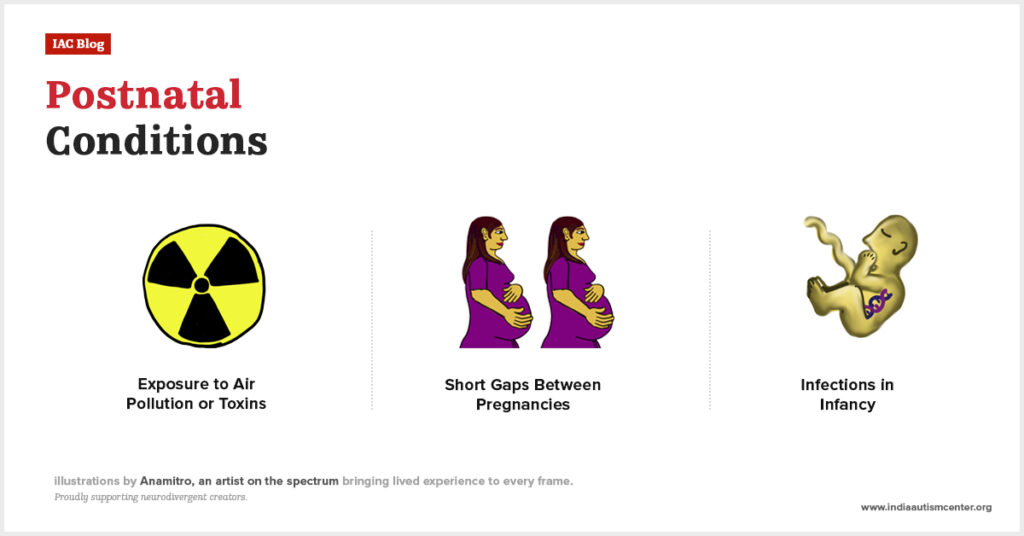
Even after birth, the brain continues to develop rapidly. A few early-life factors that may subtly shape how autism traits unfold are:
- Exposure to Air Pollution or Toxins: Infants exposed to pesticides, heavy metals, or fine particulate pollution may show immune or neurological disruptions, especially if they carry genetic risk markers.
- Short Intervals Between Pregnancies: Gaps of 12 to 18 months may deplete maternal nutrient stores, particularly folate, and increase inflammation. Both of these can affect early brain development.
- Infections During Infancy: Serious infections or immune responses during the first year of life may have a modest effect on how the brain processes information, with some associations to autism in children at high risk.
Even with all we know about contributing factors, public discourse on autism is still crowded with myths. So, let’s dismantle a few of the most damaging ones.
Want to know more? Get in touch with us.
Busting the Myths and Misconceptions About What Causes Autism
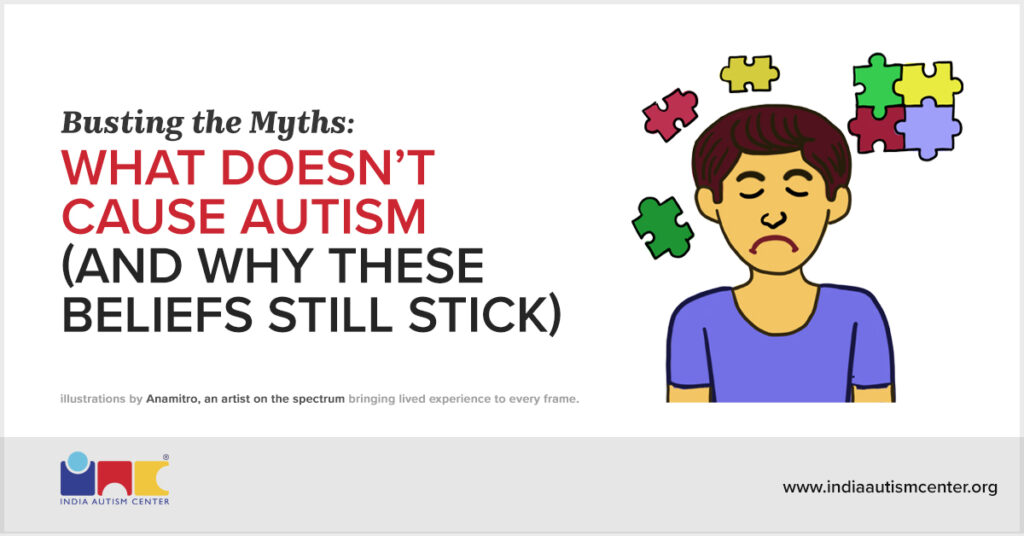
Despite major scientific breakthroughs, myths and misconceptions about what causes autism persist. Certain outdated ideas aren’t just incorrect; they stigmatize parents, derail conversations, and distract from what truly matters.
So, let’s set the record straight.
Myth 1: Something Must Have Gone Wrong
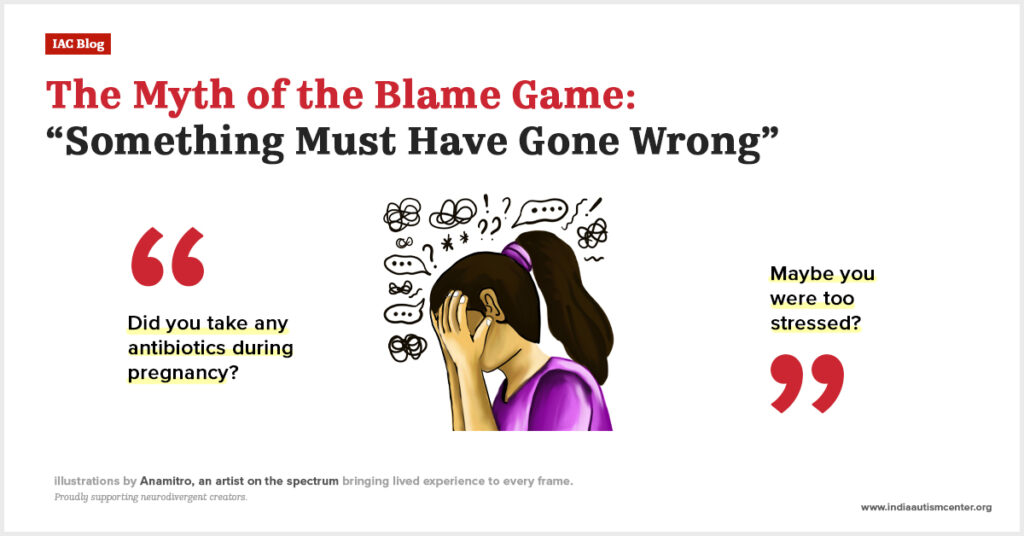
When a child doesn’t meet expected milestones, it’s natural for families to wonder why.
But often, that wondering turns into blaming, especially directed at mothers. This is not only unhelpful but also scientifically unfounded.
Autism is not the result of a momentary lapse, an incorrect meal, or a single stressful event. It develops due to complex biological factors, many of which begin before conception and are entirely beyond parental control.
Blame is a coping mechanism. But it’s not a path to clarity or action.
Myth 2: Vaccine Causes Autism
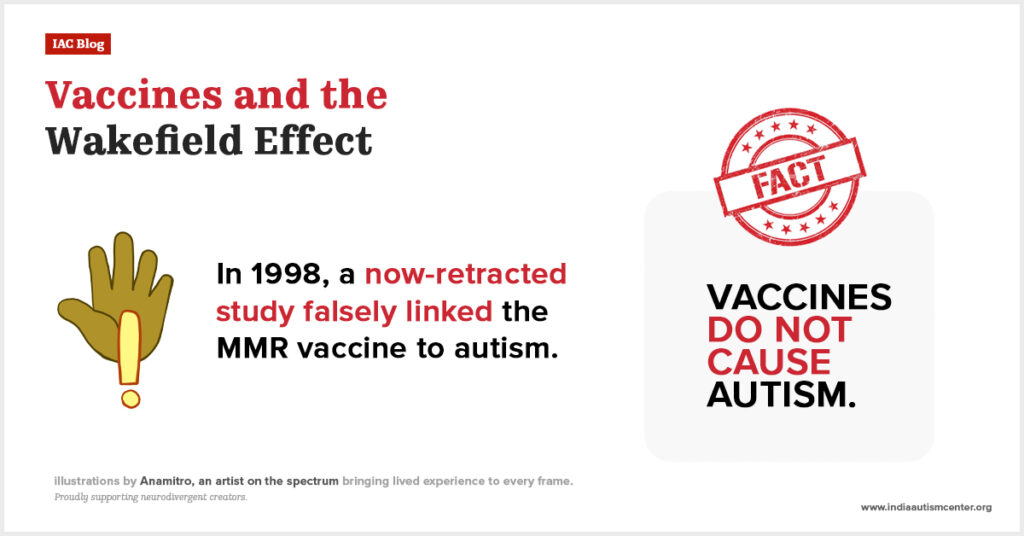
This is the myth that refuses to die.
In 1998, Andrew Wakefield published a study falsely linking the MMR (measles, mumps, and rubella) vaccine to autism. That paper was later retracted, its data discredited, and Wakefield was stripped of his medical license.
Since then, over 25 large-scale studies have confirmed: Vaccines do not cause autism.
So why do people think vaccinations cause autism? Because it offered something simple. A culprit. Many children exhibit autistic traits around age two, coinciding with routine vaccinations.
This timing seems suspicious, but it is merely a coincidence, not causation.
Myth 3: Screen Time and Modern Lifestyles Cause Autism
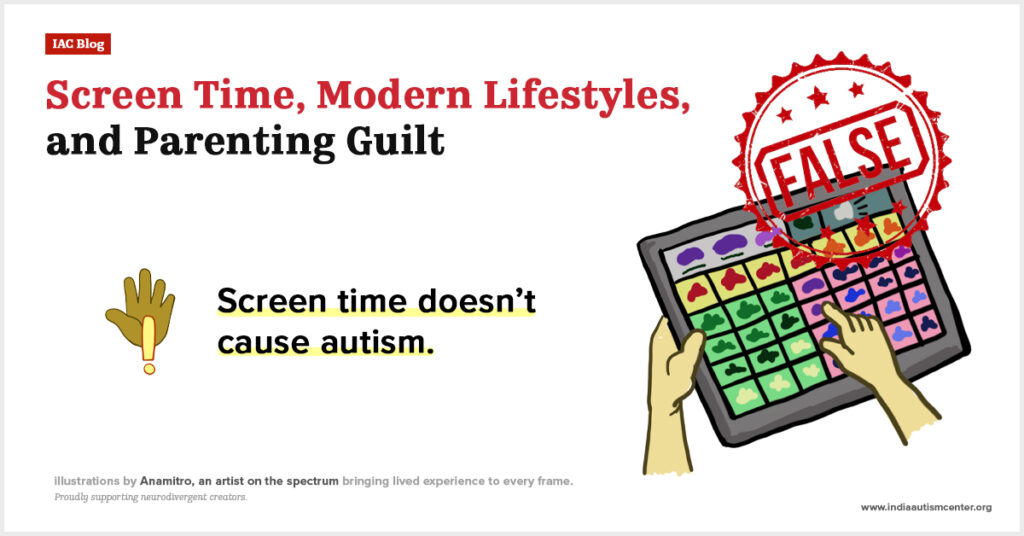
This myth grows from the anxiety of contemporary parenting.
Parents often worry that digital exposure is somehow rewiring their child’s brain. If a child avoids eye contact or loops the same video repeatedly, it’s tempting to blame screens.
But here’s the truth: Screen time doesn’t cause autism.
While it may mask early signs or provide comfort for children already diagnosed with autism, it does not cause the condition. Oversimplifying autism as a parenting choice only fuels guilt instead of providing solutions.
Myth 4: Older Parents and Late Pregnancy Always Cause Autism
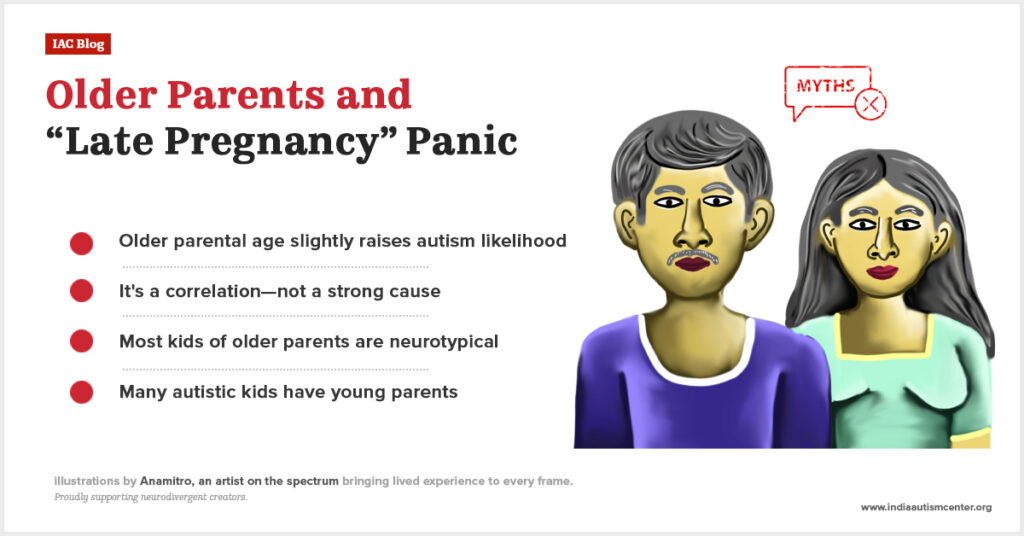
Yes, studies have noted a slight statistical association between parental age and autism. But this is more of a statistical correlation than a contributing factor for the development of autism.
Most children born to older parents are neurotypical. At the same time, many autistic children are born to younger parents.
Advanced age may slightly raise the chances of spontaneous genetic variation, but it’s not a cause. Framing autism as a consequence of delayed parenthood is only misleading and unfair.
Myth 5: Trauma, Neglect, and Attachment Issues Cause Autism
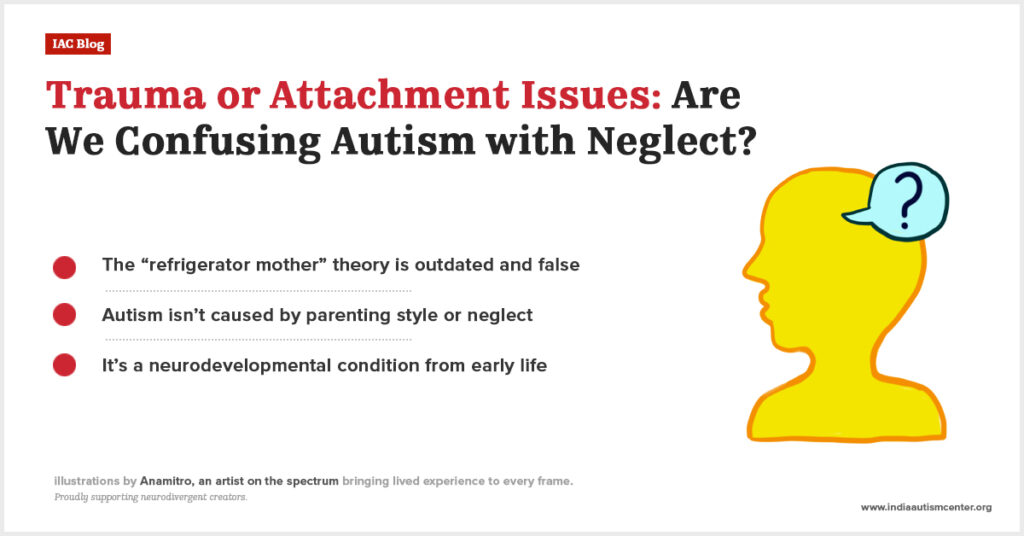
This myth has deep, damaging roots. Decades ago, the ‘refrigerator mother’ theory blamed autism on emotionally distant parenting. That view has long been debunked.
Autism is not caused by trauma, neglect, or poor attachment. However, trauma and autism can coexist. In some cases, trauma may even mimic autism traits like emotional withdrawal, speech delays, or difficulty with social connections.
This overlap often leads to misdiagnosis, particularly in girls and women. Thus, understanding the distinction is essential.
How Do Genetic Tests and Timing Assessments Work in Autism?
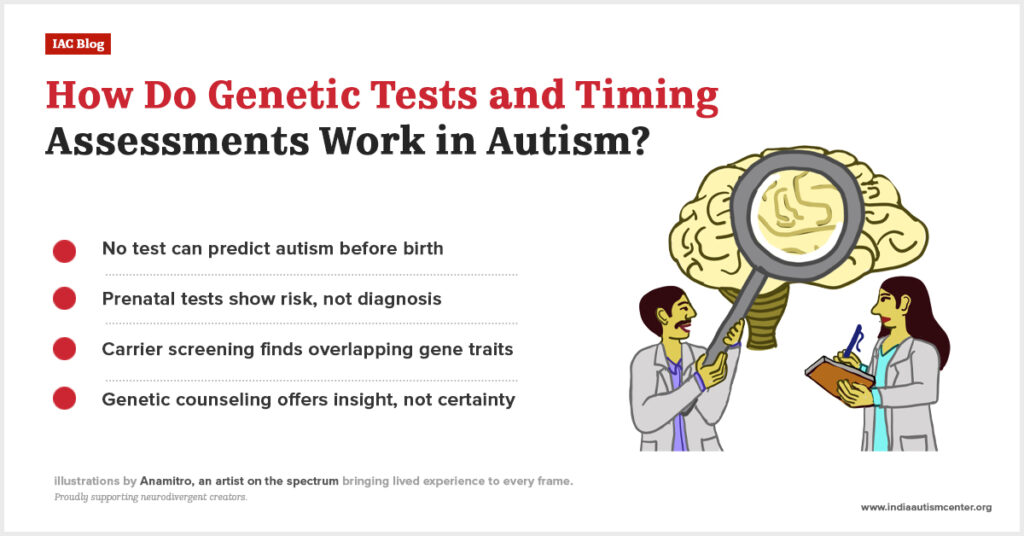
There is no single, definitive test for autism genes. However, genetic tests and timing assessments can offer meaningful insights.
So, let’s break this down.
Carrier Screening: Gauging Inherited Risk
This blood test is for prospective parents. It checks if they carry certain gene variants associated with rare conditions like Fragile X Syndrome or Rett Syndrome, which can sometimes overlap with autism traits.
Kiran Tomar, Research Associate at India Autism Center, says,
![]()
For families with a known history, this screening can offer clarity and informed preparation. But in the wrong hands, it can fuel stigma or lead to selective abortions. That’s not its purpose. The value lies in awareness, not fear.
Genetic Counseling: Interpreting the Bigger Picture
If you already have a child diagnosed with autism, have a known family history of neurodevelopmental disorders, or are concerned about future pregnancies, a genetic counselor can help decode your genetic risk and explore next steps.
They may recommend:
- Chromosomal Microarray Analysis
- Whole Exome Sequencing
These don’t predict autism. But they can help identify genetic variations linked to neurodivergence and offer contextual understanding.
Prenatal Genetic Testing: Understanding Risk
In high-risk pregnancies, healthcare providers may recommend invasive prenatal testing.
These tests examine genetic material collected from the amniotic fluid or umbilical cord to detect anomalies that may increase the likelihood of neurodevelopmental conditions, including autism.
While it doesn’t confirm autism, it may reveal:
- De novo mutations
- Chromosomal abnormalities
- Syndromes with overlap (e.g., Tuberous Sclerosis, Fragile X)
Parting Words: Letting Perspective Guide Your Next Step
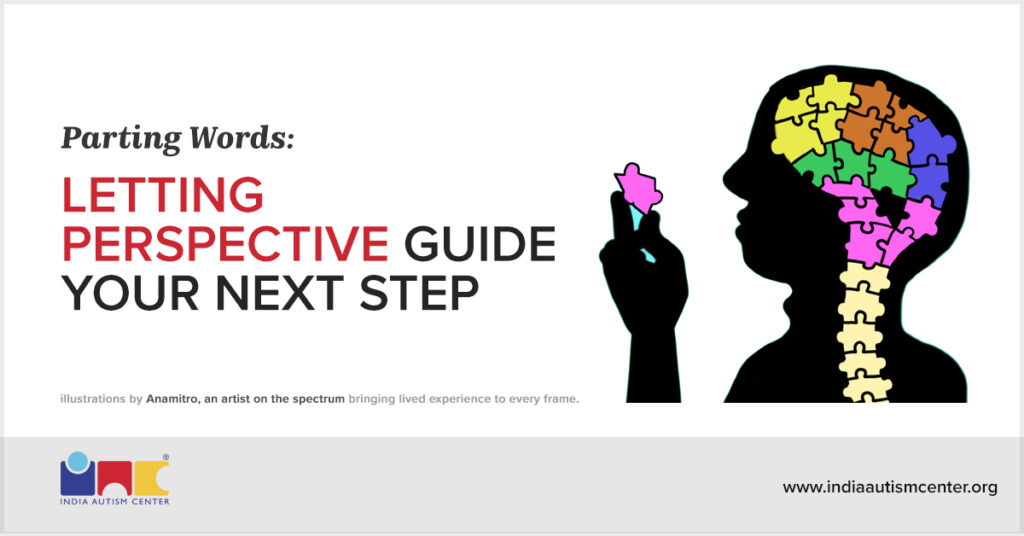
The reasons for autism are as varied as its symptoms. From inherited genetic variants to subtle prenatal influences, multiple factors contribute to it.
At the same time, there’s no genetic test that can confirm whether a child will be autistic. But there are tools to help you understand risk, possibility, and preparedness.
Some families find reassurance in clarity. Others feel overwhelmed by uncertainty. Both responses are valid.
What matters most is that informed support makes a difference. The steps you take will shape your child’s future more than any test ever could.
Frequently Asked Questions
Do vaccines cause autism?
No. Extensive global research confirms that vaccines, including the MMR vaccine, do not cause autism.
Can immunizations cause autism?
No. Immunizations do not cause autism. This myth stems from misinformation and has been disproven by more than two dozen large-scale studies across multiple countries.
If vaccines don’t cause autism, what does?
Autism is caused by a complex mix of genetic, neurological, and environmental factors. It is not triggered by vaccines, lifestyle, or parenting style.
What causes autism in children?
Primarily, genetics, early brain development, and environmental influences cause autism in children.
Can trauma cause autism?
No, trauma cannot cause autism. However, trauma can co-occur with autism or mimic certain autistic traits, which sometimes leads to misdiagnosis.
What causes nonverbal autism?
Nonverbal autism may result from more significant differences in brain regions responsible for language processing and social communication. Genetics and early neurodevelopment play a central role.
Can gestational diabetes cause autism?
Gestational diabetes is linked to a slightly higher risk of autism, particularly when accompanied by genetic predisposition. However, it is not a direct cause by itself.
What causes autism regression?
Autism regression occurs when a child loses previously acquired skills, typically between 15 and 30 months of age. The exact causes are still being researched, but they may involve immune responses, neurological disruptions, or genetic factors.
Can autism be caused by brain injury?
Brain injuries do not directly cause autism. However, early injuries affecting the brain’s development may result in behaviors that overlap with autism, though the underlying mechanisms differ.
Can food cause autism?
There is no evidence that food causes autism. Diet can affect behavior and gut health, but it is not a causal factor in autism spectrum disorder.
Can inbreeding cause autism?
Not directly. Inbreeding can increase the risk of rare genetic disorders, but autism is typically caused by a broader set of genetic and developmental factors.
For expert insights, support services, and inclusive learning initiatives, contact India Autism Center for more information.

